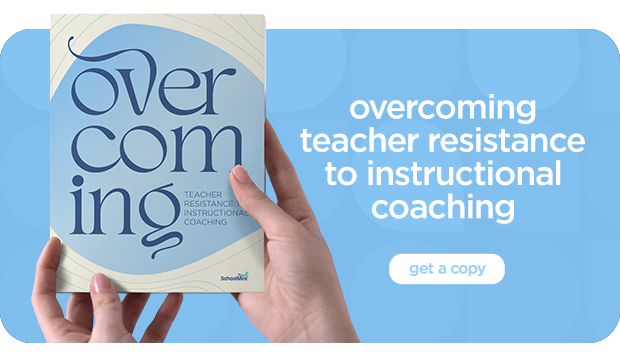The Qualities of a Good Teacher Coach
What traits make for a good teacher coach? Here are the five qualities to look for in an effective instructional coach!
An effective teacher coaching program relies on the expertise of skillful, adept coaches. So how can you identify effective coaches? First and foremost, you need to define the role of a coach.
According to a case study conducted by the National Reading Technical Assistance Center:
“The essential elements of coaching are: helping teachers improve their understanding, offering ongoing support to teachers as they implement their new understandings, and providing feedback and follow-up in a non-threatening, collegial way.”
To facilitate the growth you seek, you must understand the unique demands of your program model as well as the needs of your teachers and students.
In the process of growing teacher coaches, knowledge is power. Preparation is key.
Here’s an overview of what you can do to set your school up for success as well as the five qualities of a good teacher coach!

Identify Your Leadership Criteria
Outline your leadership criteria based on the job description of coaches within your program model. Be specific when formulating questions to evaluate potential coaches. Make sure you can answer these questions yourself!
According to instructional coaching and education expert Elisa McDonald, the role of an effective teacher leader is to “unearth cultural issues that lie beneath the surface and stand in the way of change.” Coaches must open up these issues through skillful facilitation.
Many schools, McDonald points out, operate under a “culture of nice,” in which teachers eschew “rigorous collaborative discourse where teachers are challenging each other’s and their own thinking, beliefs, assumptions, and practice” in favor of superficial praise that won’t rock the boat.
A good coach will be able to recognize indicators of cultural issues, respond proactively and in the moment, and follow up effectively.
Teacher coaches need to facilitate a culture of “vulnerability-based trust,” says McDonald. This will enable teachers to “expose their struggles and failures with colleagues” and tell the truth.
By creating a safe environment with rules and goals for discourse, teacher coaches can set up an environment conducive to this kind of culture.
Focusing on the dilemma and not the teacher, following the team’s lead, and focusing on students and practices that will encourage the growth of coaches and teachers alike.
Where Focus Goes, Energy Flows
To help your coaches improve, always maintain the focus on aspects of successful coaching. Emphasize the qualities and strategies that will help your coaches get there. Together, outline the skills and traits of an effective teacher coach.
Below are five key points to include on your list:
1. Good Coaches Know How to Build Relationships
Successful coaches foster mutual trust and respect with teachers. This creates an opportunity for vulnerability and honest, open communication throughout the coaching process.
2. Good Coaches Use Data to Inform Their Coaching Practices
Effective coaches make meaning out of quantitative and qualitative data — then form action plans around that information. Tracking progress is an integral part of teacher coaching, and effective coaches will understand how to approach data with a growth mindset.
3. Good Coaches Replace Judgment with Curiosity
A good instructional coach will facilitate a growth mindset by approaching the coaching process with curiosity. By replacing judgments with questions, a coach can show teachers a productive way to address challenges.
Even while giving feedback through evaluations, coaches should encourage teachers to reflect on their teaching practices by asking questions.
4. Good Coaches Are Experienced in Implementing Impactful Strategies
Successful coaches will be aware of the most current, impactful teaching practices and can identify their use in the classroom.
They need to be able to facilitate the implementation of these practices in the classroom. This requires knowledge and experience in areas such as co-teaching, modeling, observing, and co-planning.
A good coach should also be able to prioritize student learning while these strategies are being implemented in real time.
5. Good Coaches Can Use Difficult Conversations as Growth Opportunities
Keeping goals realistic and sharing bad news upfront are important management tactics when it comes to difficult conversations.
According to the Harvard Business Review, positive management of difficult conversations includes getting out of “the blame frame” and adopting an “and” stance.
The former will move the conversation away from judgment and toward solutions. The latter will enable the facilitator to preempt distractions, objections, and blame by taking control of the conversation.
Get the Right Support
Support from experts is the best way to ensure you’re choosing the right program model and the right coaches to make it work.
If you want to feel confident in your next steps, schedule a free demo with SchoolMint Grow!
Share this
You May Also Like
These Related Stories

Special Considerations of Instructional Coaching for Middle School Teachers

4 Steps to Implementing Teacher Coaching in Your School



